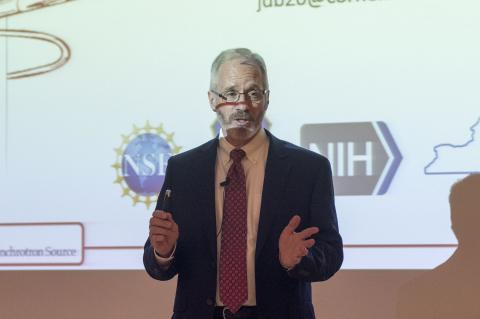These workshops are a chance to engage existing and future CHESS users, CHESS staff, and the accelerator community in the planning process for the future of CHESS. The ultimate goal is to steer the strategic planning process with the creation of a document detailing specific scientific research opportunities that can be achieved at CHESS by the year 2030. These materials will form the basis of the scientific case for multiple proposals for upgrades and operations.
Workshop timetable
| Workshop Title | Date | Workshop Link |
|---|---|---|
| High Energy X-ray Techniques (HEXT) | June 9-10 | Info and Registration |
| Soft Matter Far from Equilibrium | June 10-11 | Info and Registration |
| AI-driven autonomy to accelerate X-ray experiment-based discovery | June 21-22 | Info and Registration |
| Engineering, structural, and geological materials from processing to performance | July 13-14 | Info and Registration |
| Biology under extreme conditions | July 15-16 | Info and Registration |
| The life cycle of the elements: rocks, soils, organisms, environment (X-LEAP) | July 28-29 | Info and Registration |
| Manipulating and Measuring Quantum States at <QM>2 | Oct. 21 | More information |
| Reactions in Time and Space: Future Opportunities for Spectroscopy and Beyond | Sept 13-14 | Info and Registration |
| Accelerator Development at CHESS | Date TBD | Info and Registration |
| Ambient Crystallography | Sept 30 & Oct 1 | Info and Registration |
| Timing Experiments at CHESS | Date TBD |
In order to sustain our planet's resources and to keep up with the ever-increasing rate of scientific discovery, CHESS must stay ahead of the curve. Science-driven idea generation
With the aim of achieving success with these workshops, and beyond, we must:
-
Stay internationally competitive
-
Synchrotron lightsources need to upgrade their storage rings roughly every 10 years. The scientific interests of CHESS users play a major role in steering how the Cornell Electron Storage Ring should be optimized. We will work closely with CHESS users, accelerator physics groups. and the Cornell physics department to pursue this.
-
-
Engage Cornell faculty
-
As part of Cornell University our relationships are strong, and we will build and strengthen these relationships with Cornell faculty and researchers. CHESS is integral to the science community at Cornell, and CHESS is dependent on the pursuits and interests of these researchers.
-
-
Engage the national user community
- CHESS users come from all over the nation (and the world), some who have been using this resource for decades. The service that CHESS provides to the national user community is crucial to the success of advancing science in this country.
-
Generate agency-funded reports
- Funding from the National Science Foundation and other Federal or state agencies are paid for by the US taxpayer. We need to prove that investing in specific beamlines and programs is critical for the advancement of the United States as a leader in the national and world science stage.
To build off the success, we need to stay relevant.
